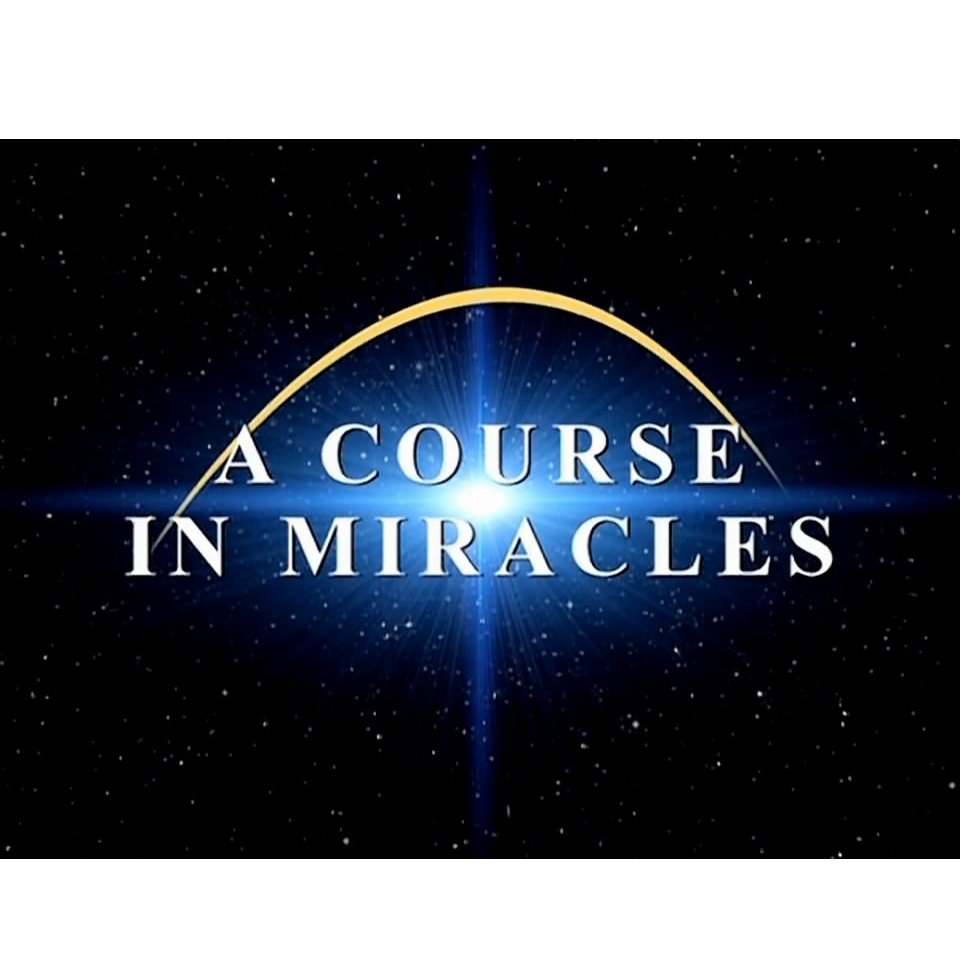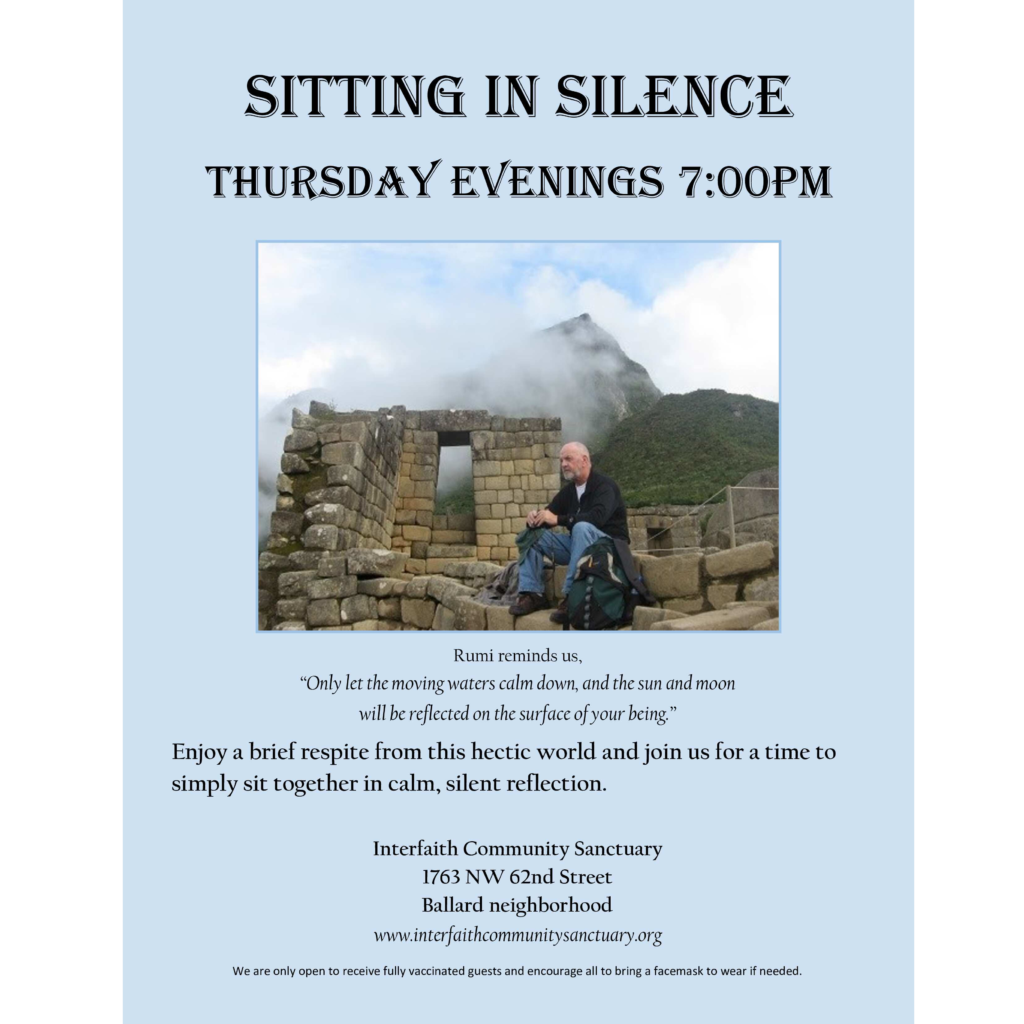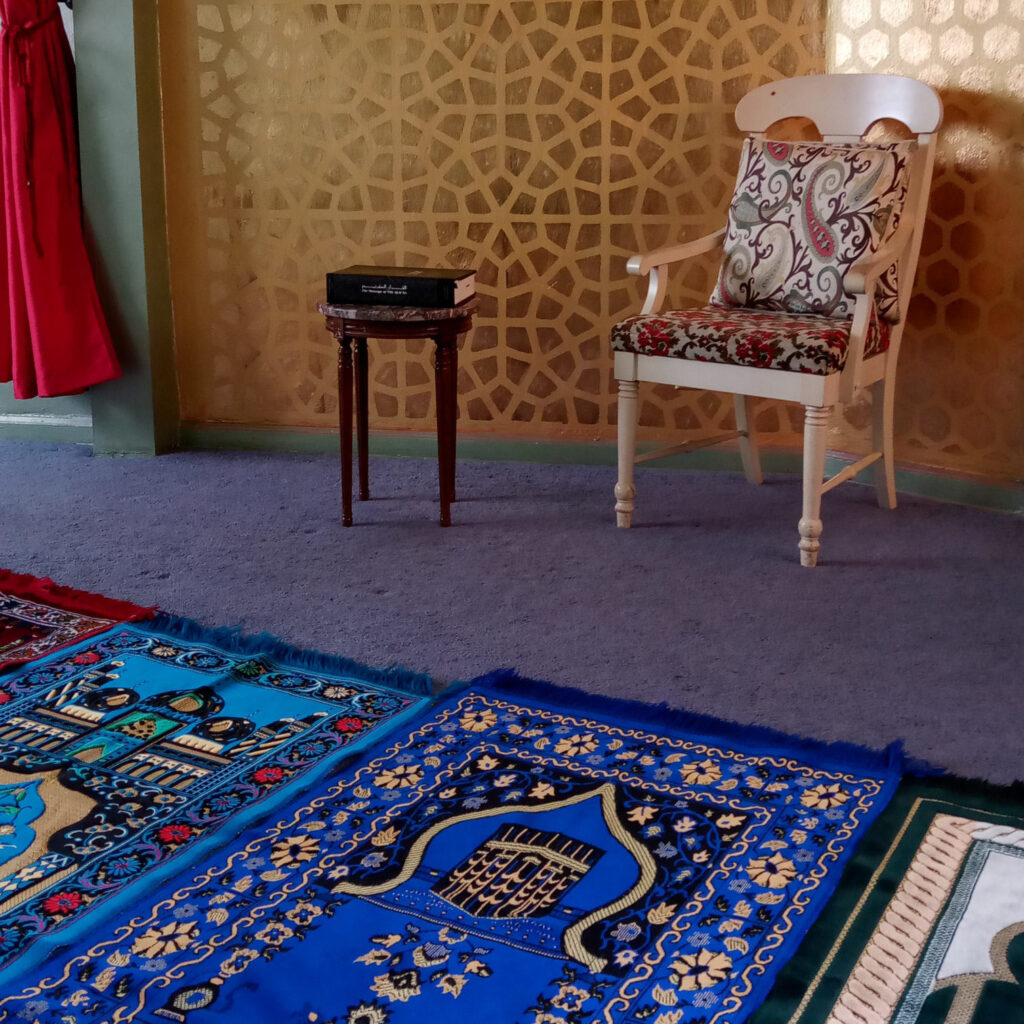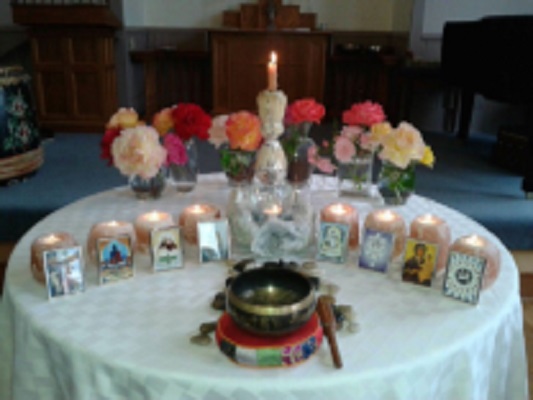Since the year 2000, Interfaith Community Sanctuary has chosen dialogue as the heart of our community and created the Guiding Council (GC) as our decision-making circle. It is comprised of members, officers, ministers and friends. With dialogue as its base, the GC meets monthly on the first Sunday after worship. GC members are stewards of our precious community and together walk a path balancing the practical and the spiritual considerations and responsibilities entrusted to them.
***
“Starting from within. working in a circle, in a sacred manner,we heal and develop ourselves, our relationships, and the world.” ~ Chief Phil Lane, Jr. Sixteen Indigenous Guiding Principles for Co-creating a Sustainable, Harmonious, Prosperous World
Council is the practice of speaking and listening from the heart. Through compassionate, heartfelt expression and empathic, non-judgmental listening, Council inspires a non-hierarchical form of deep communication that reveals a group’s vision and purpose. Council offers effective means of resolving conflicts and for discovering the deeper, often unexpressed needs of individuals and organizations. Council provides a comprehensive means for co-visioning and making decisions in a group context. Council is about our personal and collaborative story.
(From Permaculture as a Path to Peace with Jeanette Acosta.)
“When you find your place inside the circle
you are surrounded by a community that practices a willingness
to provide you with a patient, loving, compassionate understanding
of who you are, and the circle is committed to a relationship with you,
and with each other, that will help you on your life’s journey.”
~ Jeanette Acosta, Ways of Council – The Power of Listening
Our focus continues to be on listening and learning from the circle ~ perhaps even more than talking. Some of us have come to call the talking piece, a “listening piece,” to remind us to focus on our own and many of our contemporaries’ need to learn how to truly listen to ourselves, as well as to others, our ancestors and the children. Council continues to take us, time and again, beyond individual intelligence into the power of community and circle ways of knowing. Perhaps most important of all, the gift of council creates a window for grace and a place for the ultimate “Mystery” to be part of the dialogue. (From “What about Council Today?” by Gigi Coyle and Jack Zimmerman.
***
Bylaws of Interfaith Community
For many years our Guiding Council has chosen to practice the Way of Council intentions as we discuss the spiritual and practical needs of our precious community. See the basics:
In practice – The Four Intentions +1
Within the circle there are four intentions that hold the space together, which when observed, create safety and allow truth and trust to build in this very simple and powerful practice.
• Listening from the Heart
Attentive listening, witnessing. Seeking understanding and accepting others as they are, staying present and centered and when we give full attention, helps another to reach their truth more easily. Beyond ourselves and the other, is the soul of the circle. This is heard from the heart.
• Speaking from the Heart
Speaking our personal story, using “I” statements. Favouring feelings and making as transparent as possible our process. Speaking from the heart doesn’t necessarily mean using words – sound, movement, spontaneous expressions from the heart in all forms that are responsibly made are welcome. Even silence itself speaks.
– “Speak what will serve yourself, the circle, the highest good” –
• Succinctness
Being of lean expression, helps us to attend to what is important, recognise that our truth need not have to be reinforced by repetition, since we are being heard, and as there are often many in a circle, allows time for all to share.
• Spontaneity
Surprise yourself by not planning on what or rather how you will speak. Focusing on your own story while others have the talking piece will reduce capacity to ‘listen’ when they speak. The heart does not plan. Spontaneity encourages playfulness, realness and the “voice” of the moment to be free.
+1
• Confidentiality
Essential for sake of trust and respect, Confidentiality is the fifth intention held outside of circle times. What is said within the circle, stays within the circle.
Below are some circle leadership resources:
The EMPOWERMENT MANUAL: A Guide for Collaborative Groups
by Starhawk
The Empowerment Manual is a comprehensive guide for groups seeking to organize with shared power and bottom-up leadership to foster vision, trust, accountability and responsibility. This desperately needed toolkit provides keys to:
• understanding group dynamics
• facilitating communication and collective decision-making
• dealing effectively with difficult people.
Download chapter: “The Five-Fold Path of Productive Meetings“
PEER SPIRIT CIRCLING:
“Circle is not a dogmatic form. There is no one right way or wrong way to practice being together in council. Each group has its own unique set of personalities and style. This structure has proven its strength and adaptability from the first campfires of our ancestors to the global age. Each circle contributes to this long-held human tradition by the practices of listening, speaking, and thoughtful action.”
-Excerpt from a PeerSpirit publication by author Christina Baldwin.
See basic guidelines for Calling the Circle.
APPRECIATIVE INQUIRY 4-D Cycle
In the center of this cycle is an AFFIRMATIVE TOPIC:
Discovery: Appreciate “the best of what is”
Dream: Imagine “what could be”
Design: Determine “what should be”
Destiny: Create “what will be”
Article: AI Model Questions by Steve Fitzgerald, Ph.D.
Convener ‘City of Angels’ United Religions Cooperation Circle
PDF
THE PRACTICE OF SACRED CIRCLE
Explorations and initial sketch for network development and growth
PDF
OPEN SPACE HOW TO
Four Rules & One Law
The Four Rules state:
1. Whoever come are the right people
2. Whatever happens is the only thing that could have
3. Whenever it starts is the right time
4. When it’s over, it’s over
The Law of Two Feet states that:
“If, during the course of the gathering, any person finds themselves in a situation where they are neither learning nor contributing, they can go to some more productive place.”
Protecting and Restoring the Sacred
With Corinne Stone and Phil Lane Jr. Centre for Excellence, University of British Columbia,
November 9, 2019 in Indigenous Health Four Worlds International Institute
FOUR WORLDS PRINCIPLES FOR CONSULTATION
Purpose
- Create team commitment, trust among diverse participants
- Identify opportunities and solve problems
- Determine the best course of action
Ten Principles for Success
- Respect each participant and appreciate each other’s diversity. This is the prime
requisite for consultation. - Value and consider all contributions. Belittle none. Withhold evaluation until
sufficient information has been gathered.* - Contribute and express opinions with complete freedom.
- Carefully consider the views of others — if a valid point of view has been offered,
accept it as your own. - Keep to the mission at hand. Extraneous conversation may be important to team
building, but it is not consultation, which is solution driven.
© 2001, Four Worlds International
FOUR WORLDS PRINCIPLES FOR CONSULTATION
Ten Principles for Success (cont’d) - Share in the group’s unified purpose — desire for success of the mission.
- Expect the truth to emerge from the clash of differing opinions. Optimum
solutions emerge from diversity of opinion. - Once stated, let go of opinions. Don’t try to ‘‘defend’’ your position, but rather let
it go. Ownership causes disharmony among the team and almost always gets in the
way of finding the truth. - Contribute to maintaining a friendly atmosphere by speaking with courtesy,
dignity, care, and moderation. This will promote unity and openness. - Seek consensus. But if consensus is impossible, let the majority rule. Remember,
though, that decisions, once made, become the decision of every participant. After
the group has decided, dissenting opinions are destructive to the success of the
mission. When decisions are undertaken with total group support, wrong decisions
can be more fully observed and corrected.
© 2001, Four Worlds International
Suggested Qualities of Principle-Centered Leaders
Spiritually centered – actively in a relationship with the Creator
- Morally strong – lives a good moral life, suitable to stand as a role model
(particular attention to the issues of addictions, relations with the opposite sex and
honesty regarding money should be considered). - Believes in the people’s capacity to heal and develop, and shows this belief in the
way they work with the people. - Is engaged in his or her own healing journey and is a relatively healthy person.
- Has a good mind, and clearly understands the process of healing and
development, and the issues the people are facing. - Listens to the people with respect, love and humility.
- Has demonstrated devotion to the people’s healing and development by hard
work and a good attitude over a long time. - Shows true respect for the Creator, Mother Earth, and all persons (does not
show disrespect for anyone including women, men, youth, the poor, other races,
etc.). - Can work well with other in a team
- Strives to work from a position of forgiveness, unity and harmony with
everyone.
PDF: Protecting and Restoring the Sacred
https://med-fom-learningcircle.sites.olt.ubc.ca/files/2017/08/Protecting-and-Restoring-the-Sacred.pdfhttps://med-fom-learningcircle.sites.olt.ubc.ca/files/2017/08/Protecting-and-Restoring-the-Sacred.pdf










